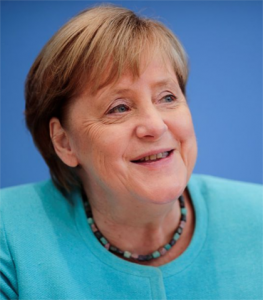Angela Merkel – heroine to thousands of refugees
As Angela Merkel steps down as German chancellor after 16 years much will be said and written about her legacy.
For progressives and those in the humanitarian sector she will be remembered for her refusal in 2015 to close Germany’s borders to thousands of migrants escaping the conflicts in Syria and Iraq.
 She will also be remembered as the leader who, amid surging nationalism and political polarisation across the west, held firm to her principles of decency and tolerance in life and politics.
She will also be remembered as the leader who, amid surging nationalism and political polarisation across the west, held firm to her principles of decency and tolerance in life and politics.
She is the longest-serving and most influential European leader of the past few decades and a stauncher supporter for a consensual, rules-based order across the globe.
Her decision to welcome Syrian refugees showed a generosity of spirit and compassion that other western democracies ought to aspire to.
The move divided Germans. Many welcomed the huddled masses at the train stations, handing out water bottles and teddy bears.
But others were appalled by the breakdown of order and felt overwhelmed by so many foreigners. And before long, a rift within her own conservative bloc nearly brought down her government.
But Merkel, known by Germans at ‘Mutti’ or ‘Mummy’ in English, stood her ground.
Uncharacteristically, she didn’t cooperate with European partners during the refugee crisis – and since then a schism has developed between the EU’s west and east with Hungary, Poland and others obstructing reforms to Europe’s migration arrangements.
But the quietly devout daughter of a Lutheran pastor has said since that it was the right thing to do. Uncommonly for a politician Merkel has a strong moral compass whose cardinal point is decency.
Like many of her compatriots, she feels that as a nation that Germany has a unique ethical and historical responsibility to help those fleeing war.
For hundreds of thousands of migrants Merkel is a heroine who gave them the chance of a new, safe life in Europe.
By the end of 2015, 890,000 asylum seekers had entered Germany, fuelling unrest from some local communities and contributing to a surge in support for the far-right parties.
But many Syrians and Iraqis now see Germany as their home and remain grateful to Merkel personally for making her decision.
One, Syrian refugee Ali Hutas, told German media that she saved his life.
“I was in Turkey in 2014 as a refugee and I had nothing. Mrs Merkel played a massive role in our lives. It’s not easy to save people’s lives. The consequences of this decision were hugely important for us,” Mr Hutas said.
“Me personally, and most of the Syrians I know, are grateful to Mrs Merkel. She made the decision and then somehow then had to carry it for Europe,” he said.
Over 16 years, Merkel has seen off five UK prime ministers, four US and French presidents as well as outlasting countless challengers and opponents, domestic and foreign.
She has also kept some outsized, and usually male, egos at the negotiating tables.
The former East German quantum physicist’s legacy as one of the most formidable, skilful and assured political leaders of modern times is assured.
Merkel will be remembered as one of the least vain world leaders of all time; a no-frills technocrat devoid of glitz or bombast.
From the global financial crisis to the European migration crisis and the rise of the far right, she deserves enduring credit for managing situations that could have become disasters.












